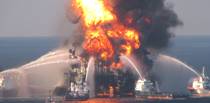Mississippi Canyon 252 – The BP Macondo Blowout
 At the bottom of the Gulf of Mexico is a canyon, much like the Grand Canyon in Arizona, except that it is covered by about a mile of sea water. It is both wide and deep. It has steep cliff-like walls. And two or three miles below the canyon floor, various oil companies have discovered vast amounts of high quality oil and gas-the lifeblood of western economies, and the hope of developing ones.
At the bottom of the Gulf of Mexico is a canyon, much like the Grand Canyon in Arizona, except that it is covered by about a mile of sea water. It is both wide and deep. It has steep cliff-like walls. And two or three miles below the canyon floor, various oil companies have discovered vast amounts of high quality oil and gas-the lifeblood of western economies, and the hope of developing ones.
Drilling into these strata is not new. It is not unknown. It is not flying by the seat of the pants. Shortcuts are not taken.
It has been done with minimal environmental impact for some 25 years on literally thousands of wells worldwide; 4,000 of them in the Gulf of Mexico alone from floating operations. Tens of thousands more have been drilled from rigs in shallower (but still hundreds of feet deep) water. Still more have been drilled in diverse locations around our planet, ranging from the North Sea to West Africa to Brazil to Australia to South East Asia to India and the Middle East and virtually everywhere in between.
Just because the environmental lobbyists admit they are clueless about the well-developed technology does not mean the technology doesn't exist or is poorly designed.
Neither does it mean that an entire industry should be shut down due to an accident - perhaps a "one in a million" accident.
This series of articles is not intended to defend BP. With Proverbial 20-20 hindsight, there are certainly things they would choose to do differently if they could. However, to cripple an industry is not the answer. To reduce domestic energy supplies by a whopping 20% at a time when the stated goal is to reduce dependence on foreign sources of oil is not the answer. To kill the jobs of hard-working highly skilled American workers in an industry started by Americans and still led by American companies, is decidedly not the right answer.
To use an analogy, let's say your neighbor accidentally shoots someone, but not fatally. (The Gulf and even sensitive Louisiana swamplands will recover from any and all damage within three years. Oil, being an organic molecule, does biodegrade.) Would it then be appropriate for a local Sherriff to arbitrarily and capriciously hand down a death sentence not just on your neighbor, but on you and everyone in your neighborhood? And should he do so without a trial or any apparent justification whatsoever except that some lobby didn't like people who owned guns?
That is precisely what the White House moratorium on deepwater drilling amounts to for tens of thousands of hard working American oilfield workers. Workers who would never ask for a dime of public assistance but would give you the shirts off their backs if you needed them. Workers that work 12-hour shifts seven days a week for weeks at a time away from home and family. Workers that in many cases were personally devastated by hurricanes of recent years but fought back and proudly rebuilt their lives without the federal government's help.
The moratorium (which at this writing has thankfully been stayed by Judge Feldman but the White House is planning to re-impose), is a death sentence to businesses up and down the Gulf Coast that depend directly on Gulf of Mexico oil and gas operations and drilling. Indirectly, the entire human ecosystem of businesses in Gulf Coast areas-restaurants, housing, recreation, clothing, appliances, charities, retailers and more-already endangered by a fragile economy caused in part by Washington blunders, now faces extinction. Make no mistake about it-the administration is voluntarily choosing (with the jobs-killing moratorium) poverty over paychecks for 100,000 or more high-paying highly-skilled American jobs.
This White House that cannot call terrorism terrorism, and cannot bring itself to officially declare war on Iraq or Afghanistan (with thousands of American soldiers lost), has now declared war on the American oil industry-over an accident-a terrible accident to be sure-but still an accident.
First in a series of articles... Stay tuned.




Comments
Facebook Comments
Make sure to check out the comments on Facebook.
Reply to comment Mississippi Canyon 252 – The BP Macondo Blowout
Re: NOAA Study and Valdez
I’m not familiar with this particular NOAA study, but nearly all visible or chemically active traces of the Valdez spill were gone within ten years. Though an estimate of 26,000 gallons remaining sounds large, it pales in comparison to the official estimate of 11,000,000 gallons spilled in the Valdez, (0.0024 or 0.24% of the original, and undoubtedly is only relatively inert “road asphalt” type hydrocarbon left…little if any visible oil, no fouling of birds or fish, etc. Biologic activity has degraded 99.8%!) The Amoco Cadiz spill was virtually undetectable sooner than that. The reason for optimism here, is twofold. First, crude oil comes in a wide variety of types—thick, thin, heavy, light, sour, sweet, various amounts of dissolved natural gas, and everything in between. Fortunately the crude from the Macondo well disperses and breaks down faster than the Valdez crude. Second, biological activity is strongly dependent on temperature. Since the swamps of Louisiana and water in the Gulf of Mexico are MUCH higher average temperature than beaches in Alaska or waters of Prince William Sound, the biological breakdown will occur roughly four times faster. This has been observed in other Gulf of Mexico spills as well, prior to Macondo (shipping, pipelines, Ixtoc, and even natural seepage from the sea floor, estimated at 1000 barrels (42,000 gallons) per day in the Gulf of Mexico, etc.) Thanks. Mark